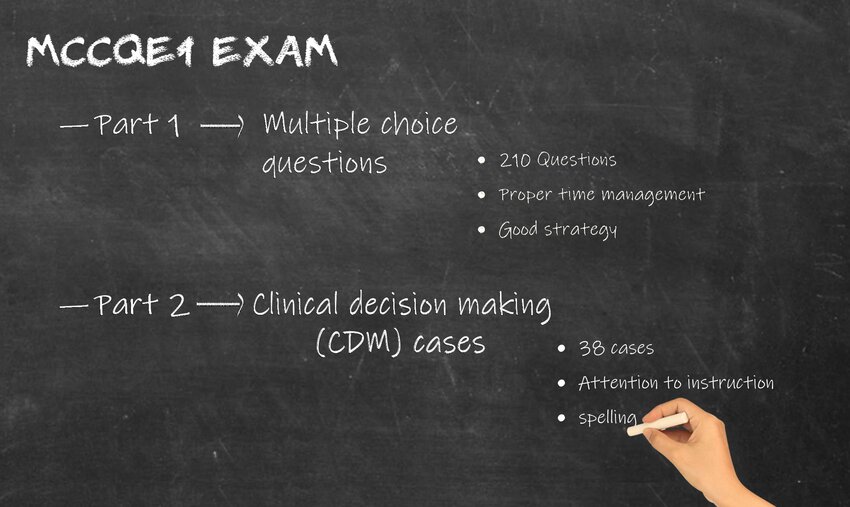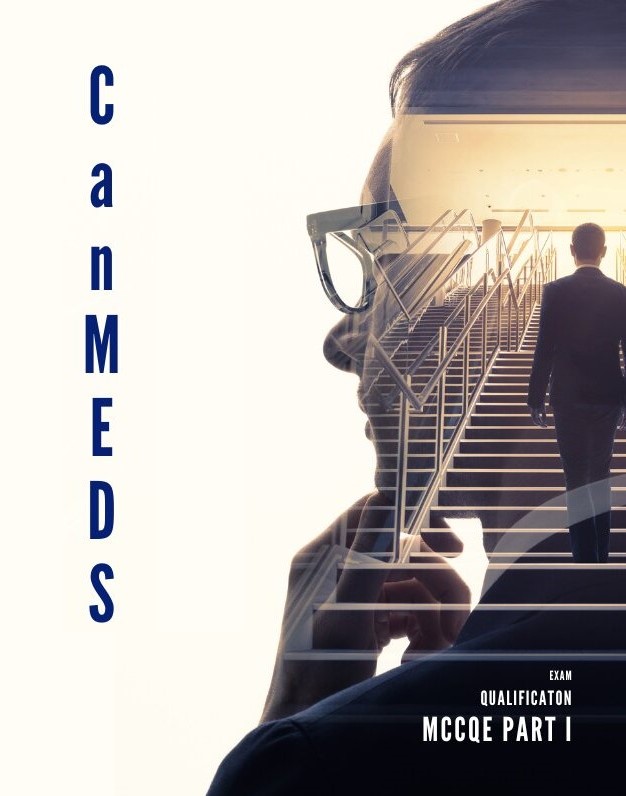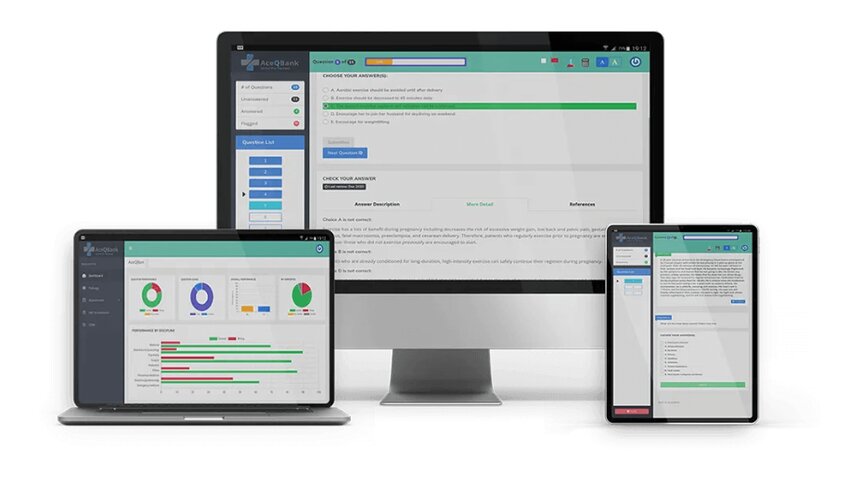CanMEDS Roles | Key to Success in MCCQE1 Exam

On the journey to becoming a physician in Canada, the Medical Council of Canada Qualifying Examination (MCCQE) Part I is an important milestone for medical graduates. Passing MCCQE Part 1 successfully requires candidates to possess both medical knowledge and the ability to apply it effectively in the clinical setting.
We find that the Canadian Medical Education Directives for Specialists (CanMEDS) roles are at the heart of understanding and applying medical knowledge in the MCCQE1. These roles provide an all-encompassing overview of the responsibilities that embody a well-rounded physician. The CanMEDS framework lays out the vital competencies required for every physician, ensuring they practice medicine safely and effectively.
Designed with passion by the Royal College of Physicians and Surgeons of Canada (RCPSC), this groundbreaking framework aims to promote professional medical competencies among Canadian physicians.
However, the significance of the CanMEDS roles has become increasingly important in assessing medical competency, particularly during the MCCQE1 exam, as the number of International Medical Graduates (IMG) is increasing each year.
In this blog, we’ll start by discussing the CanMEDS roles’ importance in the MCCQE1 exam. We’ll then explore how mastering these roles can lead you toward triumphant success in your MCCQE1 exam preparation. Lastly, we will discuss how Ace QBank plays a pivotal role in your exam preparation and its effectiveness in promoting comprehensive test readiness.

What Does CanMEDS Stand For?
In Canadian healthcare, CanMEDS defines the competencies and roles expected of physicians and healthcare professionals. CanMEDS stands for Canadian Medical Education Directives for Specialists and is a framework developed in Canada that has been adopted widely around the world.
CanMEDS aim to prepare physicians to meet the evolving challenges in healthcare. It involves seven roles that serve as the foundation for the competencies required for healthcare professionals to provide high-quality patient care.
The Medical Expert role focuses on the clinical skills and knowledge required for patient care. The Communicator role emphasizes the importance of clear, effective communication with patients, colleagues, and other healthcare professionals. The Collaborator role emphasizes teamwork and promotes the idea that healthcare professionals must work together to provide optimal patient care.
The Leader role focuses on developing leadership skills, decision-making, and the ability to manage resources to improve patient care. Health Advocacy addresses social determinants of health and promotes public health policies. The Scholar role emphasizes lifelong learning and continual professional development. Finally, the Professional role focuses on upholding ethical and professional standards and prioritizing patient safety, privacy, and confidentiality.
In order to provide high-quality patient care, the CanMEDS roles emphasize collaboration, communication, lifelong learning, and professional ethics, among other competencies. Implementing CanMEDS has transformed healthcare education, assessment, and practice globally, particularly in Canada.
On the other hand, understanding the significance of the CanMEDS roles in today’s healthcare system is crucial. These roles are not just mere titles but represent the essential skills and abilities that healthcare professionals must possess to provide quality patient care. Later in this blog, I will highlight the CanMEDS role’s significance in MCCQE Part 1.

What Are The CanMEDS Roles?
The CanMEDS roles are a framework of competencies that guide medical education and practice in Canada. These roles include Medical Expert, Communicator, Collaborator, Leader, Health Advocate, Scholar, and Professional. They aim to ensure that physicians are equipped with the necessary skills and knowledge to provide high-quality, patient-centred care.
The CanMEDS framework developed by the Royal College of Physicians and Surgeons of Canada, this visionary framework has been adopted across Canada and globally, inspiring healthcare professionals to strive for excellence.
At the heart of the framework lies a core mission; to produce well-rounded physicians who possess clinical expertise and an array of essential abilities vital for delivering holistic and person-centred care.
Imagine an ideal doctor who listens carefully to patients, builds trust through empathy and compassion, and works well with other healthcare providers for the benefit of their patients. The CanMEDS framework aims to cultivate these qualities in every medical professional.
By incorporating seven key roles – Medical Expert, Communicator, Collaborator, Leader, Health Advocate, Scholar, and Professional, this model fosters a more comprehensive understanding of what it truly means to be a competent physician.

It also acknowledges that doctors need more than clinical skills to achieve the best patient results. They also need emotional intelligence, critical thinking abilities, and ethical values.
The CanMEDS framework has revolutionized medical education by emphasizing that exceptional patient care requires an intricate balance between clinical skills and human connection. As future generations of physicians step into this world guided by these principles, we can expect enhanced collaboration among healthcare teams and improved quality of life for our communities – all thanks to the unwavering passion behind the framework!
Not only that, but the CanMEDS framework plays a key role in the MCCQE Part 1, as it is an examination that assesses the medical knowledge and clinical skills of medical graduates and is also designed to assess a candidate’s communication skills and professionalism, which are essential qualities for any practicing physician.
So, gaining a deep understanding of this framework is crucial for candidates to ensure their utmost preparedness for the exam. This is an incredibly significant aspect because the MCCQE1 exam is a decisive tool that gauges their readiness to practice medicine in Canada’s beautiful and diverse nation.

CanMEDS Roles in MCCQE1 Exam Preparation
In the ever-changing field of medicine! We are all aware of how crucial knowledge and clinical skills are to the practice of medicine. But, a set of professional qualities that healthcare professionals need to possess to provide their patients with the best care possible is another important factor that needs to be considered.
That’s where the CanMEDS framework comes in! It’s designed to make sure medical professionals like you have all the essential competencies to practice effectively within Canada’s healthcare system. The framework includes seven roles:
- Medical Expert
- Communicator
- Collaborator
- Manager
- Health Advocate
- Scholar
- Professional
Now, let’s talk about the MCCQE1 exam. The Canadian qualification exam evaluates your readiness for practicing medicine effectively within Canada’s healthcare system. It assesses your medical knowledge, clinical skills, and understanding of the CanMEDS framework. This comprehensive evaluation ensures that you are well-prepared to provide quality healthcare to patients in Canada.
Various assessment methods are employed to gauge your proficiency in each domain, including multiple-choice questions (MCQs) and objective structured clinical cases.
Interestingly – the Medical Council of Canada (MCC) embraces the principles outlined in CanMEDS. They see a strong connection between the CanMEDS roles and the MCCQE Part 1, especially with recent updates to their objectives.
Here’s a tip for success on the MCCQE1 exams: focus on understanding the CanMEDS roles. Knowing them will help you cover all the exam objectives and inspire a deep passion for excellence within you – a passion that’ll serve you throughout your medical career!
Start preparing for the exam, mastering the MCC objectives and let CanMEDS be your guiding star as you navigate the MCCQE1 exam preparation journey.
Optimizing Your MCCQE1 Performance
The MCCQE1 exam stands as a monumental milestone on the journey of medical graduates who aspire to become licensed medical practitioners in Canada. This remarkable moment presents an opportunity for these dedicated individuals to showcase their unwavering commitment, mastery, and expertise in the intricate and demanding field of medicine.
Indeed, conquering the MCCQE Part 1 signifies more than just passing a test – it is a critical step towards fulfilling their professional aspirations and advancing their career as healthcare practitioners. Therefore, it is important for these individuals to approach this examination with diligence, dedication, and a steadfast commitment to excellence.
As a medical graduate preparing for the MCCQE Part 1, it is important to understand the CanMEDS framework and the MCCQE1 blueprint. The CanMEDS framework is a set of competencies that outline the roles and responsibilities of a physician. These roles are integrated into various components of the MCCQE1 exam, such as clinical decision-making, ethics, communication skills, etc.
On the other hand, the MCCQE1 blueprint outlines the weighting of the content of each section of the exam. Understanding the blueprint to focus your study on the areas most heavily tested is important.
To get ready for the MCCQE Part 1, it’s crucial to familiarize yourself with the CanMEDS roles and their incorporation into every part of the exam. Furthermore, comprehending the MCCQE1 blueprint will assist in concentrating on your studies and guaranteeing that you’re well-prepared for each aspect of the exam.
Properly covering the MCC objectives without incorporating CanMEDS and MCCE1 blueprint will make passing the exam an uphill battle. So, investing time in grasping these vital concepts will make you more likely to excel on the qualification exam.

MCCQE1 Exam Format
Understanding the exam format entails more than simply being aware of logistics; it involves delving into the essence of the exam, deciphering its complexities, and mentally and emotionally preparing for upcoming challenges. Embrace the exam as an opportunity to showcase one’s knowledge, skills, and aptitude in medicine.
The MCCQE Part 1 is no ordinary exam; it is a rigorous test that separates the exceptional from the ordinary. This requires commitment, persistence, and a thorough grasp of medical principles. The day of the exam represents the culmination of years of learning, innumerable hours spent preparing, and an unwavering determination to succeed in the field of medicine.
For those aspiring to pass the MCCQE Part 1, familiarity with the exam format becomes an indispensable tool. It provides a sense of structure and direction, allowing them to navigate the exam confidently. The knowledge that the exam is divided into two parts with different question types ensures that candidates know the situation, that the multiple-choice questions await them in the morning and the clinical cases that will challenge their clinical decision-making abilities in the afternoon.
With this awareness, candidates can tailor their preparation strategies accordingly. They can devote ample time to mastering the art of answering multiple-choice questions effectively, honing their ability to analyze options, eliminate distractors, and arrive at the correct answer efficiently.
Simultaneously, they can fine-tune their clinical reasoning skills, preparing themselves to tackle the complex scenarios presented in the clinical cases. By understanding the nuances of each question type, candidates can maximize their chances of success.
Beyond the practical implications, knowing the exam format also plays a crucial role in alleviating anxiety and uncertainty. The looming presence of a high-stakes examination can be overwhelming, casting a shadow of doubt on even the most capable minds.
When candidates are well-acquainted with the structure of the exam and have a clear understanding of how to tackle each question type, the previous sense of uncertainty fades away. It is replaced by newfound confidence, leaving no room for hesitation, ultimately leading to an optimal performance driven by self-assurance.
The MCCQE Part 1 is a gruelling test that stretches over more than eight hours—a true test of endurance, mental acuity, and resilience. Some argue that the duration of the exam simulates the demanding workday of a Canadian physician, preparing candidates for the challenges that lie ahead in their careers. Whether or not this is the intention, there is no denying that the exam pushes candidates to their limits, demanding their utmost focus and concentration throughout the entire process.

The two distinct parts of the exam serve different purposes but are equally important in evaluating a candidate’s readiness to practice medicine in Canada. The morning session, with its 210 multiple-choice questions, tests a candidate’s knowledge base, assessing their understanding of fundamental medical concepts. It challenges them to think critically, apply their theoretical knowledge, and make informed decisions within the confines of the question format.
The afternoon session, commonly known as the CDM (Clinical Decision Making) part of the exam, presents candidates with a series of clinical cases. These scenarios act as practical examples, imitating doctors’ daily work difficulties. In this context, candidates are assessed on their medical expertise as well as their capacity to combine data, examine intricate circumstances, and devise suitable management strategies.
By understanding the format and purpose of each part of the qualification exam, candidates can better prepare themselves mentally and emotionally. They can approach the exam day with a clear mindset, knowing that they have invested time and effort into mastering the essential skills required to excel in each component.
While this may seem like an insurmountable task for many medical graduates, Ace QBank serves as a beacon of hope for those seeking to conquer this mountainous challenge. The question bank is tailored specifically toward the exam format and content; thus, every objective laid down by the Medical Council of Canada (MCC) has been considered and incorporated into questions and clinical cases.
Ace QBank provides you with thousands of high-yield questions covering every single aspect of the first part of the exam. Furthermore, it offers hundreds of top-notch clinical cases that are tailored toward assessing students’ performance in different dimensions based on CanMEDS roles.
It’s understandable that you might initially feel overwhelmed with all the complex concepts and terminology, such as MCC objectives, MCC blueprint, and CanMEDS roles. But worry not! Ace QBank is here to guide you through this exciting journey with unwavering support. Our comprehensive learning approach, deeply rooted in evidence-based medicine, is designed to help you conquer every challenge on your path to success.
At Ace QBank, we are driven by our passion for empowering candidates like you. We have carefully curated our practice questions to closely simulate real-life exam conditions, ensuring that you’ll be more than ready to shine when the time comes for your MCCQE1 exam! So take a deep breath and trust in Ace QBank – it’s time to ignite your passion for learning and embrace the road toward medical excellence!
Studying with CanMEDS in Mind
One critical aspect that medical graduates must pay attention to while preparing for the Medical Council of Canada Qualifying Examination Part 1 is the CanMEDS role and MCC objectives.
The connection between the CanMEDS roles and the MCCQE1 exam is of utmost importance, as the purpose of this examination is to evaluate your competence in these seven crucial roles alongside assessing your medical knowledge and clinical expertise.
The CanMEDS framework, developed by the Royal College of Physicians and Surgeons of Canada, outlines the core competencies required for physicians to provide high-quality patient care. This framework encompasses seven key roles: Medical Expert, Communicator, Collaborator, Leader, Health Advocate, Scholar, and Professional.
The MCCQE1 exam is a critical evaluation tool to ensure that medical graduates possess the knowledge and skills to address various medical scenarios. By focusing on these CanMEDS roles in a comprehensive manner, the examination provides an accurate assessment of one’s aptitude for applying these competencies within real-world clinical scenarios.

Mastering the CanMEDS roles is crucial for achieving success in the MCCQE1 examination. Furthermore, it lays a solid groundwork for your continuous professional development within the medical field. By cultivating expertise in these domains, you can ultimately contribute to improved patient outcomes and the delivery of comprehensive healthcare services.
On the other hand, when studying for exams, it’s a good idea to break down the CanMEDS roles into smaller units. This approach can enhance your efficiency and guarantee a thorough grasp of all the necessary competencies required for optimal performance. By organizing and focusing on specific areas, you’ll be better prepared to demonstrate your knowledge and skills.
For instance, combining the following CanMEDS roles together:
- Medical Expert & Scholar
- Communicator & Collaborator
- Leader & Professional
- Health Advocate
Medical Expert & Scholar
Combine these two roles, as they both deal with knowledge acquisition and application. When studying each objective, ensure to read the explanation section of the Ace QBank.
Every question in the Qbank is carefully crafted to align with the specific MCC objective. You can find the corresponding objective for each question mentioned in the reference section. Our evidence-based medicine explanations aim to emphasize the essential aspects related to that particular objective.
At Ace QBank, we take the medical experts of the CanMEDS roles seriously. That’s why we prioritize the accuracy and relevance of our content, especially when it comes to the medical experts of the CanMEDS roles.
We understand the importance of staying up to date with the latest developments in the medical field, and we are committed to providing the most current and evidence-based information available.
The content is regularly reviewed and updated by a team of experts who are dedicated to ensuring that our users have access to the most relevant and accurate medical information. We follow an evidence-based medicine approach, which means that our content is based on the most current and reliable research and clinical evidence available.
We also understand that the medical field is constantly evolving, with new discoveries and advancements being made all the time. That’s why we make it a priority to integrate the most current information into our content. We stay abreast of the latest research, guidelines, and best practices in order to provide our users with the most up-to-date information available.
By consistently keeping the content up to date, we aim to support medical professionals in their pursuit of knowledge and excellence. We believe that by providing accurate and current information, we can contribute to the ongoing education and development of medical professionals, ultimately improving patient care and outcomes.
With Ace QBank, you can trust that you are receiving the most current and evidence-based medical information available. We are committed to helping you stay informed, engaged, and prepared as you navigate your medical career.
Communicator & Collaborator
These two roles focus on effective communication and teamwork in healthcare settings. Although most candidates are familiar with these concepts, it’s crucial to recognize their importance within the context of patient-centred care and multidisciplinary collaboration.
Leader & Professional
These roles are related to decision-making, ethics, accountability, and responsibility within healthcare teams. Remember to follow the proper chain of command and know when situations require escalation or consultation with higher authorities.
Health Advocate
While Canadian medical graduates may already grasp this role, International Medical Graduates (IMGs) should emphasize learning Canadian guidelines and recommendations for preventive measures and screening programs.
It may take time and dedication to integrate these concepts into your exam preparation fully, but patience is key in this journey. Embracing all seven CanMEDS roles doesn’t solely involve acquiring knowledge or honing clinical skills; it necessitates adopting a comprehensive approach to patient care that encompasses empathy, communication, leadership, and advocacy.
As you move forward in your quest for mastery of the CanMEDS roles, allow yourself room for growth and learning from every experience along the way. Becoming proficient in all seven roles is not an overnight process but a continuous commitment to expanding your understanding of delivering high-quality care to patients.
MCCQE1 Blueprint
The MCCQE1 Blueprint is more than just a simple guide. It is a roadmap that provides an in-depth overview of the various competencies and objectives tested on the exam and weighs their relevancy in accordance with CanMEDS roles. By outlining what knowledge and skills are required of physicians, the blueprint helps candidates focus their study efforts effectively.
But it’s not enough to know what’s on the exam. The key to achieving success on the MCCQE1 lies in understanding how to shape these objectives into two major categories:
- Physician Activities
- Dimensions of Care
By mastering this categorization, candidates can cover all necessary ground and explore every avenue within each CanMEDS role.
It’s important to note that your performance on the MCCQE Part 1 will be evaluated based on these two major categories outlined in the MCC Blueprint. Therefore, incorporating this framework into your study plan is essential for passing and scoring high on the exam.
We extend a warm welcome to this valuable resource and encourage its use in preparing for the MCCQE1. As aspiring physicians, you should use CanMEDS to fuel your enthusiasm for medicine and strive hard to provide excellent patient care. With unwavering dedication and hard work, success in the MCCQE Part 1 exam is undoubtedly within reach.

Healthcare delivery is a critical aspect of medicine. It covers various areas, including promoting health, preventing illnesses, providing acute and chronic care, rehabilitation, support care, and end-of-life care.
In essence, it encompasses the entire spectrum of medical care. As a medical graduate, knowing and understanding these aspects is vital to developing a comprehensive approach to addressing different medical conditions.
One critical component of healthcare delivery is providing prevention advice and screening recommendations. When it comes to this aspect of healthcare delivery, the patient’s age should guide your approach. It is a reliable north star that helps you navigate the best course of action for each patient.
But when it comes to providing prevention advice and screening recommendations, it’s essential to use Canadian resources for exam preparation. This way, you can ensure that you are fully prepared for your exams in line with Canadian guidelines.
By utilizing proper Canadian resources, you will be well-prepared to tackle exam questions and clinical cases based on Canadian guidelines and recommendations.

This dimension addresses the key activities that physicians perform in their daily practice. These activities encompass assessment (history-taking and physical examination), investigation (ordering appropriate tests), formulation of management plans (treatment and follow-up recommendations), counselling patients and families, and other tasks such as resource utilization and consultation with other healthcare providers.
In real-world practice, most physicians follow the same steps, and they tailor their history-taking and physical examination after interviewing the patients based on the presented chief complaint to gather all relevant information to come up with a differential diagnosis.
Then, based on the lab result and/or diagnostic procedure, or imaging study, they come up with the diagnosis, proper management and treatment for the medical conditions.
The whole point is that you do not have the luxury of properly gathering information. In fact, you have zero control over the amount of information that will be at your disposal to answer the questions, but knowing the general steps, having medical knowledge, and a good understanding of differential diagnosis for the chief complaint is more than enough to help you select the correct answer.
The MCCQE1 exam is a standardized computer-based exam. That means the past medical history, physical examination findings, laboratory results and all other relevant information are provided, including the result of the imaging study or even the imaging study itself provided for you to come up with an accurate diagnosis or proper management.
So, if there is enough information to select the correct answer, why is the exam challenging?
This is a smart and valid question. One of the most common challenges that candidates often encounter is effectively managing their time, efficiently recalling critical information to analyze clinical cues, and understanding the roles of CaMEDS.
Candidates often struggle with time management during MCCQE Part 1. Candidates might struggle to divide their time appropriately among all questions, resulting in a hurried and inefficient execution. This issue is particularly noticeable in the initial phase of the exam, where there’s restricted time for data collection and choosing the correct answer.
Another common challenge is the efficient recall of critical information needed to analyze clinical cues given in the question stem. Question and CDM cases often require candidates to interpret patient histories, physical examination findings, and diagnostic test results. Retrieving and utilizing this information in a timely manner can be overwhelming, particularly when faced with a large volume of complex data.
Understanding the roles of CaMEDS is also crucial but can be challenging for certain candidates. Each component of CaMEDS represents a distinct aspect of patient care that candidates need to demonstrate proficiency in during exams or interviews. Effective communication skills, critical assessment abilities, sound medical management decisions, and a clear understanding of ethical and legal principles are essential for success, but candidates may struggle to adequately address all these areas within the limited time constraints of an exam.
To overcome these challenges, candidates can employ various strategies. Time management skills can be enhanced by practicing questions in time mode to simulate real testing conditions. Candidates can develop effective study habits and learn to prioritize tasks, allowing them to allocate sufficient time to different sections. Additionally, practicing efficient note-taking and active recall techniques can aid in the retrieval of critical information during exams.
To better understand and apply CaMEDS principles, candidates can engage in case-based learning and role-playing exercises. These activities help candidates develop clinical reasoning skills and build confidence in their ability to address each component of CaMEDS in a systematic and efficient manner. However, Ace QBank has incorporated the CanMEDS in both question and clinical cases to provide valuable insights and opportunities for improvement.

Overall, the biggest challenge that candidates seated for the MCCQE1 exam face is properly managing the time during the exam. Time management itself depends on multiple variables. The two major variables among all are the speed of the comprehension of questions and recalling the critical information while analyzing the question stem.
In other words, the faster you find clinical clues and analyze all relevant information in the question, the faster you can eliminate the wrong options and select the correct answer.
But that’s only part of it since there are 210 questions to answer on exam day. It’s important to have a good strategy to do well on tests. This will help you manage your time effectively and answer questions at a steady pace.
This is where Ace QBank is come in. Ace QBank, a question bank specifically designed for the MCCQE1 exam, offers a wide range of high-yield questions and clinical cases for practice. The question bank provides opportunities for candidates to improve their speed in comprehending questions, analyzing clinical clues, and eliminating incorrect options.
Imagine having access to over 2500 high-yield questions meticulously designed to prepare you for the first part of the exam. These questions are carefully crafted to cover the breadth and depth of medical knowledge you need to succeed based on the MCC objectives.
They challenge you to think critically, apply your understanding of medical concepts, and make informed decisions. With each question you tackle, you grow stronger, building the confidence that will carry you through the exam.
But that’s not all. Ace QBank understands the importance of practical application in medical practice. It recognizes that the Clinical Decision Making (CDM) component of the exam requires a unique set of skills. That’s why it provides you with over 140 clinical cases specifically tailored to the CDM portion of the exam.
By engaging in real-life situations, these cases enable you to simulate the process of decision-making as a doctor. Through this experience, you can enhance your abilities in clinical reasoning, establish a structured method for problem-solving and improve your skills in creating effective management plans.
As far as enhancing retention and helping with recalling critical information, Ace QBank has included many flow charts and summary tables along with hundreds of high-quality illustrations to emphasize the key points of the medical concepts, simplify the complex concepts and help you remember all essential information.
So, you could identify the clinical clues and analyze all relevant information from past medical history, Physical examination funding to laboratory results, and imaging a study provided for you in the question within the allotted time.
The secret is that when you have the medical knowledge and clinical skills, you know what to look for in question or given clinical cases. In contrast, without medical knowledge, one will always struggle to analyze a question or understand a clinical case properly within an allotted time.
It is important to note that mere memorization is not sufficient for success in the MCCQE1 exam. Candidates need to have a deep understanding of medical concepts and clinical skills to effectively analyze questions and clinical cases within the allotted time. The use of flow charts, summary tables, and other visual aids can complement this understanding and facilitate better recall of information.
Flow charts are particularly designed for the management steps. The question bank’s explanation sections include flow charts and summary tables, which can be accessed with both the premium and basic packages. Therefore, it is highly recommended to take advantage of these resources. They help you better understand and recall medical concepts when you need to recall them the most.
Remember, the MCCQE1 exam is not just a stepping stone but a testament to your commitment to the noble profession of medicine. It is an opportunity to showcase your abilities, your compassion, and your unwavering dedication to the well-being of others. With Ace QBank as your trusted companion, you can confidently embrace the challenge, knowing you have the tools and resources to excel.

How Can Ace QBank Help with MCCQE1 Exam Preparation?
As you begin your path toward becoming a certified physician in Canada, the MCCQE Part 1 exam can feel like a daunting challenge. The pressure to excel may seem overwhelming, but rest assured that Ace QBank is here to provide comprehensive support and guidance throughout your journey.
At Ace QBank, we combined MCC objectives, MCC blueprints, and CanMEDS roles comprehensively to alleviate the burden and facilitate the preparation process for the MCCQE1 exam.
Ace QBank’s highly dedicated and knowledgeable team of experts has put in countless hours and immense effort to develop an extensive Canadian question bank that will significantly boost your preparation for the upcoming exams. We truly understand the importance of access to top-notch study materials and recognize that your success is our ultimate goal.
With unwavering dedication, every question and clinical scenario in this extensive collection has been diligently curated to adhere to the rigorous standards the Medical Council of Canada (MCC) set forth. Our foremost goal is to offer you an invaluable tool that empowers you with the assurance and expertise necessary to excel in your examinations.
The carefully designed questions are meant to evaluate your understanding of key concepts and MCC objectives. Simultaneously, our in-depth explanations delve into each topic extensively, offering you a clearer insight into evidence-based medicine, thus allowing you to apply these principles effectively in your professional journey.
We wholeheartedly believe in empowering future healthcare professionals like yourself by providing indispensable tools that augment both theoretical knowledge and practical application. This passion drives us to constantly refine the question bank, ensuring its relevance and effectiveness for you who strive for excellence.

Immerse yourself in a collection of over 2,500 high-yield questions meticulously crafted to ignite your passion for medicine and propel you toward conquering the challenging MCCQE Part 1 exam. Questions are designed to awaken the physician within you, each question sharpens your medical knowledge and prepares you for challenging MCCQE Part 1. Embrace this unparalleled opportunity to think like a doctor, evolve as a medical professional, and thrive in the world of healthcare!
The high-yield questions available to you are designed with features such as flowcharts, summary tables, and high-resolution custom illustrations that work together seamlessly to provide an enhanced understanding of complex medical concepts. These resources are created specifically to help you grasp difficult concepts more easily and better recall essential information on exam day.
On the other hand, an extensive collection of clinical cases is designed to help them prepare for the CDM part of the exam. With 140 top-notch CDM cases available, candidates can access a wide range of scenarios covering different topics and situations.
In addition to these cases, the question bank also offers two mock exams (self-assessments) for the MCCQE Part 1, which are designed to simulate the actual exam experience and provide students with an opportunity to assess their knowledge and skills.
But what sets Ace QBank apart from other study materials is its commitment to constant improvement. Question bank utilizes not one but two update systems to ensure that the platform remains reliable and up-to-date for medical graduates preparing for the MCCQE1 exam.
Every update adds new questions and clinical cases to the pool of questions and CDM cases. And just as importantly, outdated content is eliminated while current questions and clinical cases are enhanced. This dedication to keeping the content updated is just one reason why Ace QBank is an invaluable resource for anyone preparing for the exam.
With the Medical Council of Canada’s objective list serving as our North Star, we remain steadfast in our commitment to follow the exact framing of the updated blueprint. Fear not, dear exam taker; with our expert guidance, you will breeze through your exam without a hint of difficulty. We stand united in our dedication to shaping tomorrow’s medical landscape with a sharp focus on excellence and innovation.
Last but not least, the self-assessments provided by Ace QBank are meticulously created to simulate the format and difficulty level of the actual exam, thereby providing candidates with an accurate measure of their preparedness for the qualification exam. By offering such a realistic experience, these mock exams enable candidates to gain confidence in their abilities and reduce anxiety levels, ultimately leading to better performance on the exam day.
On the other hand, the mock exam questions are carefully crafted to be distinct from the main question bank. These questions are hand-picked by a team of experienced medical experts who ensure that they not only cover all the topics tested in the exam but also accurately measure a candidate’s preparedness. This thorough process guarantees that candidates will be fully prepared to tackle any challenges they may face during the exam.
With Ace Qbank, you’ll feel confident and fully equipped to tackle any question that comes your way. Don’t settle for anything less than the best; sign up for the free demo today and experience the power of Ace QBank for yourself!
Through several years many have asked questions about Ace QBank products. We have provided a comprehensive list of frequently asked questions and detailed answers to help address any concerns or queries you may have about the Ace QBank. It’s a great resource to better understand how the platform works, its features, and how it can benefit you in your studies.
In case you encounter any technical issues, rest assured that a dedicated support team is always ready to assist you. Whether it’s a glitch in the system or an error message that leaves you puzzled, you can rely on our support team members’ expertise and prompt response.
Simply reach out to them, and they will gladly guide you through troubleshooting steps or provide further clarification.


